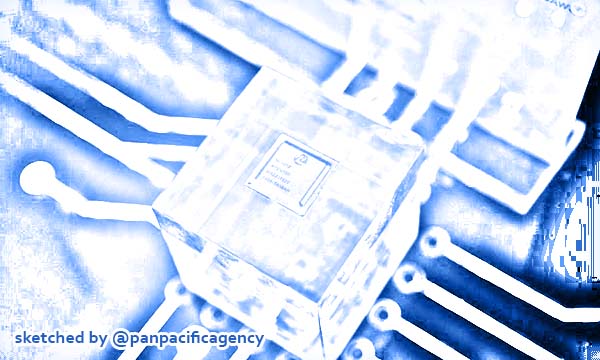China poaches 3,000 chip engineers, but Taiwan winning from trade war

A chip from Huawei subsidiary HiSilicon on display earlier this year. New research shows the Chinese firm closing the gap with US suppliers. Photo: ImagineChina. Sketched by the Pan Pacific Agency.
TAIPEI, Dec 4, 2019, Taiwan News. China has lured away 3,000 chip engineers from Taiwan as part of its “Made in China 2025” plan to complete a “red supply chain” with all foreign competitors eliminated, but the U.S.-China trade war has put a monkey wrench in the country’s grandiose plans, Taiwan News reported.
The “Made in China 2025” initiative, a major source of friction between the U.S. and China, is a plan unveiled in 2015 to enable the communist country to overtake its Western rivals in multiple technological fields. This plan includes building a “red supply chain” with Chinese technology companies given favorable government treatment to enable them to squeeze out foreign competitors, including Taiwanese firms, entirely from the production process.
A major stepping stone in creating this red supply chain is luring away top Taiwanese chip engineers to apply their expertise in Chinese firms. Taiwan’s Business Weekly reports that over 3,000 Taiwanese semiconductor engineers have been poached by China in recent years.
Based on data from the Taiwan Institute of Economic Research, this amounts to approximately 10 percent of all of Taiwan’s engineers engaged in semiconductor research and development. Although the practice of enticing Taiwanese engineers is not new, the quantity of high-level engineers poached by China has accelerated significantly since 2015.
Beijing is reportedly offering double or triple the pay and benefits that top-grade Taiwanese engineers would receive at home. In the case of one 50-year-old engineer who spoke to Nikkei Asian Review, he said that he was offered double his pay in Taiwan and funding for his child to attend a private school.
The report cited an industry insider as saying that Chinese firms are recruiting “not only top executives, but entire production teams on the ground.” The source also claimed that Chinese companies are offering “two to three times” as much as their Taiwanese counterparts.
Taiwanese companies are trying to counter this trend by raising pay levels, but they are at a disadvantage as they do not enjoy the massive government subsidies and market protections the Chinese companies receive. Although Taiwan has beefed up its Trade Secrets Act (營業秘密法) to penalize those who leak corporate secrets abroad with up to 10 years in prison and a fine of up to $NT50 million, many engineers are still jumping ship to China.
China issued the “31 Measures” on Feb. 28, 2018, in a bid to attract more Taiwanese talent and win sympathy from the public.
On Nov. 4 of this year, China’s Taiwan Affairs Office (TAO) and National Development and Reform Commission (NDRC) announced 26 additional “measures to further promote economic and cultural exchanges and cooperation between the two sides of the Taiwan Strait.” These included 13 for Taiwanese companies and 13 for Taiwanese citizens, which are purported to be provided with “equal treatment with the Chinese populace.”
However, both sets of measures have been widely mocked in Taiwan as mere propaganda ploys. In addition, Taiwan has actually benefited from the U.S.-China trade war in terms of greatly increased exports to the U.S. at the expense of China.
On Nov. 5, the UNCTAD released a report titled “Trade and Trade Diversion Effects of United States Tariffs on China,” which acknowledged that the trade diversion effects have increased imports from nations not directly engaged in the trade war and brought “substantial benefits” to Taiwan, Mexico, and the European Union.
On Nov. 18, German online statistics portal Statista published a report showing that over the first nine months of this year, U.S. imports from Vietnam and Taiwan have seen a year-on-year surge of 35 and 21 percent, respectively. During the same period, U.S. imports from China plummeted by 13 percent.
While China may be attracting some Taiwanese engineers, Taiwan is bringing whole companies and production lines back home from China thanks to a combination of government incentives and the trade war. In August, Taiwan surpassed its goal of seeing returning Taiwanese companies invest a total of NT$500 billion, four months ahead of schedule.
On August 2, the Ministry of Economic Affairs (MOEA) revealed that with another four companies signing up for the program, the total for the year so far had reached NT$504.7 billion, CNA reported. The government expected the investments to create 43,900 jobs inside the country.
As of Nov. 28, the MOEA announced that 156 Taiwanese-owned companies that had been operating in China had pledged NT$703.4 billion in investments, according to InvesTaiwan. The MOEA estimates that the total infusion of investment is expected to bring 56,000 new jobs to the manufacturing sector, reported Taiwan Today.